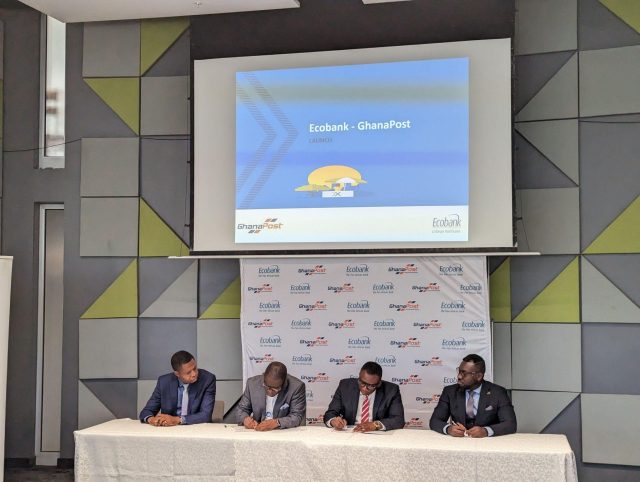The nation’s financial inclusion and digitalistion drives have been given added impetus following the formalisation of a strategic partnership between Ecobank and GhanaPost, which will see the former leverage Ghana Post’s comprehensive network of over 300 outlets to provide agency banking services.
Under the agreement, GhanaPost will market selected products and services of Ecobank’s Xpress Points – which are approved locations that allow customers to access basic banking services such as deposits, withdrawals and remittances through GhanaPost’s numerous post offices throughout the nation’s regions.
Speaking at the signing ceremony, Managing Director of Ecobank Daniel Sackey explained that partnership with GhanaPost represents a significant step toward deepening the nation’s financial inclusion agenda.
He added that it is consistent with Ecobank’s vision of enabling every adult Ghanaian to open and operate a bank account – thereby providing access to banking services for everyone, no matter where they live or what their financial situation may be.
“Since the introduction of Ecobank Mobile in November 2016, we have been working toward empowering the largely unbanked and underserved people of Ghana, by providing them access to cheaper basic banking tools and equip them to perform everyday banking transactions without visiting a bank. We do this to ensure that the underserved markets become financially literate as a means to gaining financial freedom, as we plan to deepen financial inclusion in Ghana,” Mr. Sackey explained.
“This partnership is ample evidence of our commitment to bringing affordable banking services to the doorstep of every Ghanaian. We will continue to employ technology and partnership deals with key retailers and SME businesses across Ghana to provide exciting financial products for Ghanaians… This plan will also deepen the financial literacy of underserved markets, empowering them toward financial freedom,” he added.
Over the last few years, the bank has worked toward empowering unbanked and underserved populations through the introduction of Ecobank Mobile – providing access to cheaper basic banking tools which equip people to perform everyday transactions without needing to visit their bank, he added.
The Ecobank MD is confident that the initiative’s success will be ensured by the outfit’s network – which comprises 67 branches, 5,000-plus Xpress Points, 2.4 million customers, and its rich bouquet of services.
He also called on all stakeholders to join hands in deepening Ghana’s financial inclusion agenda: reminding everyone that their collective efforts will bring Ecobank closer to its vision of “building a Pan-African banking institution that contributes to the economic development and financial integration of the continent”.
On his part, the Managing Director of GhanaPost, Bice Osei Kuffour – in a speech delivered by his Deputy Kwaku Tabi Amponsah, stated that the deal will accelerate efforts of Ghana Post to diversify its revenue sources as it transforms into a multi-service one-stop-shop offering a wide variety of services.
“The partnership will not only enhance Ghana Post’s revenue generation efforts but also enable the organisation to provide a seamless and comprehensive range of services to its customers, cementing its position as a convergence point for logistical and financial needs,” he said.
He noted that at launch Ecobank’s services will be available at 78 post offices across the nation, with another 22 to be added shortly. In the not-too-distant future, all GhanaPost outlets will offer the services.
The 2021 Financial Services Demand-Side Survey Report shows that Ghana has made significant progress toward holistic financial inclusion. The report indicates that 96 percent of the adult population in Ghana now has access to financial services, surpassing the targetted 85 percent for 2023. This is a remarkable increase from the 41 percent reported in the 2010 FinScope Survey and 58 percent reported in the Financial Inclusion Insight Survey of 2015.
















